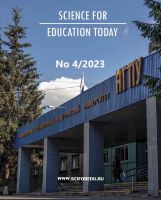Структура и содержание познавательной компетентности студентов вуза с инвалидностью по слуху в цифровой среде: критерии и способы экспертной оценки
Structure and contents of hearing impaired university students’ epistemic competence within digital learning environment: Criteria and evaluation methods
Author(s): Andrey A. Gareyev, Ekaterina Petrovna Ponomarenko, Anastasia Andreevna Shishkina, Yulia V. KrasavinaSubject(s): Higher Education , Inclusive Education / Inclusion, Sociology of Education, Distance learning / e-learning
Published by: Новосибирский государственный педагогический университет
Keywords: Competence structure; Epistemic competence; Deaf students; Hard-of-hearing students; Digital learning environment; Expert group evaluation; Questionnaire;
Summary/Abstract: Introduction. A range of international and Russian studies addressing teaching hearing impaired university students focus on their cognitive and psychological differences from their hearing peers. However, they rarely discuss extremely relevant issue of learning in a digital environment which has untapped educational potential for the deaf and hard-of-hearing. The purpose of this paper is to rationalize a multi-component structure and content of hearing impaired university students’ abilities and skills to learn effectively, also known as epistemic competence, within a digital environment. Materials and Methods. The draft of the structure and content of this competence was designed relying on literature review, then improved and verified by means of the qualimetric approach, in particular, the procedures of expert group evaluation method. Results. Using a questionnaire and self-assessment techniques, the authors identified factors determining the expertise in teaching deaf and hard-of-hearing students, the grade scale to evaluate the experts based on these factors has been designed, and 10 experts have been selected. The questionnaire aimed at improving and approving the structure (components) and content (criteria) of deaf and hardof-hearing students’ epistemic competence in a digital learning environment have been designed and used in order to survey the experts. The authors rationalize the structure of the epistemic competence consisting of four components: motivation-based, cognitive, activity-based, and communicative. The content of components is presented as a list of criteria and evaluation methods for them. Conclusions. The developed structure and content represent an attempt to standardize teaching and learning of hearing impaired students. It is concluded that the proposed structure provides a way to identify challenges deaf and hard-of-hearing students face in learning online, and thus contributes to more effective epistemic competence development.
Journal: Science for Education Today
- Issue Year: 13/2023
- Issue No: 4
- Page Range: 148-169
- Page Count: 22
- Language: Russian

